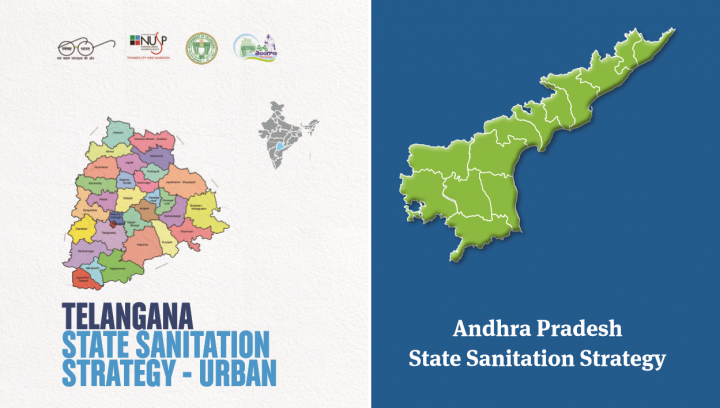State Sanitation Strategies of Telangana, Kerala and Andhra Pradesh - SNUSP II
State Level Sanitation Committee (SLSC), Deutsche Gesellschaft für Internationale Zusammenarbeit (GIZ) (2016)

Published in: 2016
Publisher:
Commissioner & Director of Municipal Administration Department
Author:
State Level Sanitation Committee (SLSC), Deutsche Gesellschaft für Internationale Zusammenarbeit (GIZ)
Uploaded by:
SuSanA Admin
Partner profile:
common upload
3957 Views
295 Downloads
Location of library entry
Sanitation as per National Urban Sanitation Policy (2008) is defined as safe management of human excreta, including its safe confinement treatment, disposal and associated hygiene-related practices.
The Twelfth Five Year Plan (2012-17) of the states of Andhra Pradesh, Telangana and Kerala target to reduce the gap between the demand and supply of urban infrastructure services by increasing investments in urban infrastructure. The National Urban Sanitation Policy (NUSP) of the Government of India announced in 2008, entrusted state governments to prepare their State Sanitation Strategy (SSS) in line with constitutional provision. As per the Constitution, ‘water’ and ‘sanitation’ are classified as state subjects. ‘Water’ is included in Entry 17 under the List II i.e. the State List of Seventh Schedule, explained as:
“Water, that is to say, water supplies, irrigation and canals, drainage and embankments, water storage and water power subject to the provisions of Entry 56 of List I”
• ‘Sanitation’ is a subject matter included in Entry 6 of the State List as established through Article 246 of Constitution of India.
• India is committed to the Sustainable Development Goals (SDGs), Post Development Agenda 2030 which entails 17 Goals. Goal 6 is on Clean Water and Sanitation which says – ‘’Ensure availability and sustainable management of Water and Sanitation for all’.
• The National Five Year Plan for the period 2012 - 2017 has identified the urban sector as one of the eleven priorities in the country.
Improved sanitation is one of the critical determinants of the quality of human life that largely impact the outcomes for public health, environment and dignity. The positive outcomes of the sanitation interventions contribute to the economic growth propelled by livable cities. Investments made in the sanitation sector for urban areas will not only yield higher human development indicators but will also contribute to the state’s economic growth.
Bibliographic information
State Level Sanitation Committee (SLSC), Deutsche Gesellschaft für Internationale Zusammenarbeit (GIZ) (2016). State Sanitation Strategies of Telangana, Kerala and Andhra Pradesh - SNUSP II. Commissioner & Director of Municipal Administration Department
Filter tags
East Asia & Pacific English Politicians and local decision makers















